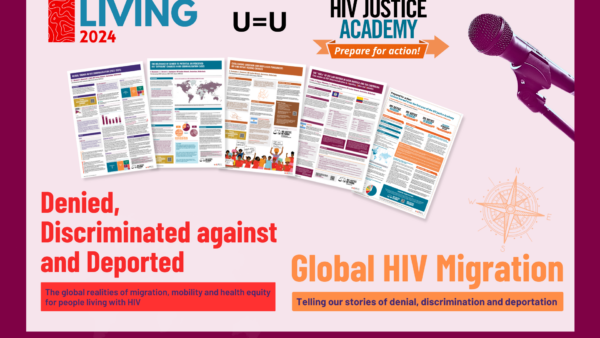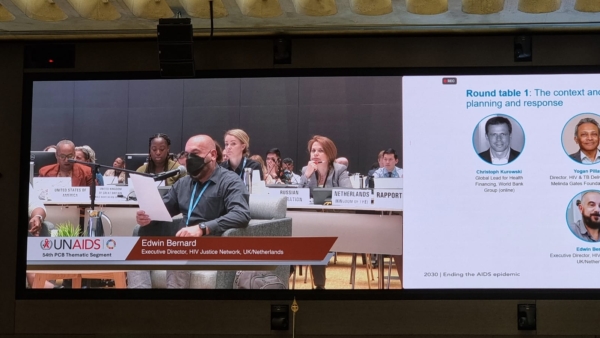
They are seeking to decriminalise the risk of HIV infection in Baja California.
Translated from Spanish with Deepl.com – For original article, please scroll down.
The deputy for the second district of the Baja Californi a State Congress, Jaime Eduardo Cantón Rocha, said he is working on an initiative to decriminalise the risk of HIV infection, considering it discriminatory.
Article 160 of the Baja California Penal Code establishes a penalty of 1 to 4 years in prison for a person who, ‘knowing that he or she is ill with a venereal disease or other serious illness during an infectious period, puts the health of another at risk of contagion, through sexual relations or other transmissible means, or violating a duty of care’.
In addition, an aggravating circumstance of five to nine years’ imprisonment is added if the disease is incurable.
Discrimination
In this regard, Cantón Rocha stated that this article has been used mainly against people with the Human Immunodeficiency Virus (HIV), who in some cases happen to be members of the LGBT+ community, which is why he considered this law to be discriminatory.
“(The law) is very focused on this disease (HIV). And the truth is that in the statistics, people of sexual diversity have a higher rate of infection than heterosexual people,’ he said.
Because of this, he considered that changing this article is important both for the LGBT+ community and for people living with HIV.
“This is obviously discriminatory because you cannot criminalise a person for carrying a disease. Especially because a person will never ask to be in a situation of any disease or contagion,’ he said.
Human Rights
In this sense, the also president of the Diversity Commission in Congress, indicated that they will harmonise this law in accordance with respect for human rights.
Although he did not specify whether there are any people being prosecuted under this law, he pointed out that it is a violation of human rights simply because this type of condition is classified as a criminal offence.
On HIV, he pointed out that there are important studies published recently that reveal substantial advances in reducing the virus in the body. He also assured that public health institutions are now effectively dealing with such cases.
Article 160 also stipulates that both the accused and the complainant must be compulsorily required to undergo curative treatment for the disease in question in an appropriate institution.
Buscan despenalizar riesgo de contagio de VIH en Baja California
El diputado por el segundo distrito del Congreso del Estado de Baja California, Jaime Eduardo Cantón Rocha, dijo trabajar en una iniciativa para despenalizar el riesgo de contagio de VIH por considerarlo discriminatorio.
El artículo 160 del Código Penal de Baja California establece sancionar de 1 a 4 años en prisión a la persona que, “ha sabiendas de que está enfermo de un mal venéreo u otra enfermedad grave en periodo infectante, ponga en peligro de contagio la salud de otro, por relaciones sexuales u otro medio transmisible, o violando un deber de cuidado”.
Además, se agrega un agravante con pena de cinco a nueve años en prisión en caso de que la enfermedad padecida resulte incurable.
Discriminación
Al respecto, Cantón Rocha aseveró que dicho artículo ha sido usado principalmente en contra de personas portadoras del Virus de Inmunodeficiencia Humana (VIH), que en algunos casos resultan ser integrantes de la comunidad LGBT+, por lo que consideró esta ley como discriminatoria.
“(La ley) está muy enfocada hacia esa enfermedad (VIH). Y la verdad es que en la estadística las personas de la diversidad sexual registran un mayor índice de contagios que las personas heterosexuales”, expresó.
Debido a esto, consideró que cambiar este artículo resulta importante tanto para la Comunidad LGBT+, como para las personas portadoras del VIH.
“Esto es evidentemente discriminatorio porque no puedes criminalizar a una persona por portar una enfermedad. Sobre todo porque una persona nunca va pedir estar en una situación de alguna enfermedad o contagio”, expresó.
Derechos humanos
En ese sentido, el también presidente de la Comisión de la Diversidad en el Congreso, indicó que armonizarán dicha ley conforme al respeto a los derechos humanos.
Aunque no precisó si existen personas procesadas por esta ley, señaló que es violatorio de derechos humanos por el simple hecho de que este tipo de condiciones se cataloguen delitos penales.
Sobre el VIH, destacó que existen estudios importantes publicados recientemente que revelan avances sustanciales para la disminución del virus en el cuerpo. Asimismo, aseguró que las instituciones de salud pública atienden efectivamente dichos casos en la actualidad.
El artículo 160 también establece que, tanto al denunciado como al denunciante, deberá imponerse obligatoriamente un tratamiento curativo de la enfermedad en cuestión en una institución adecuada.









